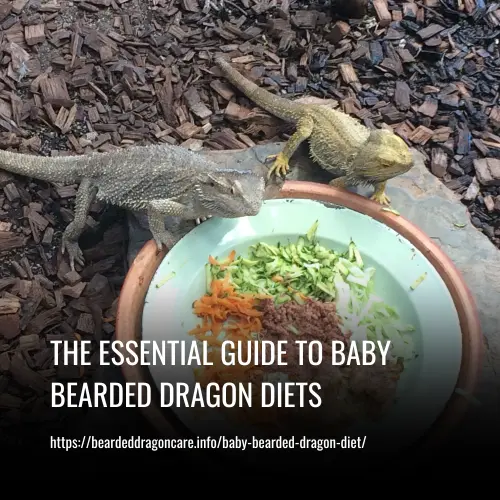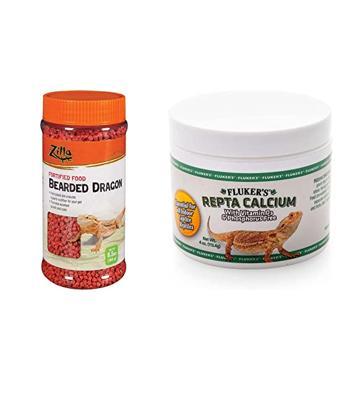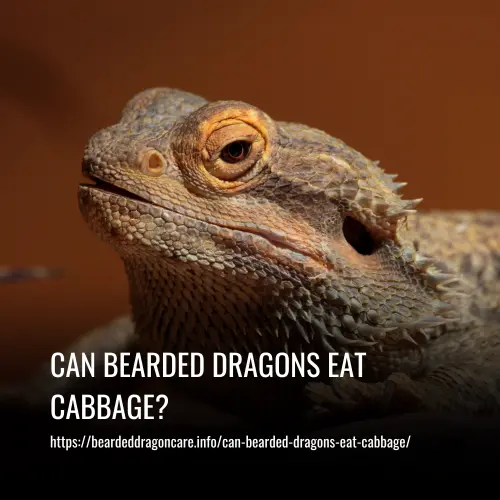Having a pet bearded dragon can be a rewarding and enjoyable experience. However, it is important to ensure that your pet is getting the proper nutrition in order to stay healthy and happy. To ensure proper nutrition, a baby bearded dragon’s diet needs to include fresh vegetables, fruits, bugs, and other types of protein.
In this article, we will discuss the best diet for baby bearded dragons and how to provide them with the nutrients they need.

Baby Bearded dragon diet
When compared with adults, baby Bearded dragons need a more selective diet to get going in life. This is what new owners should know about the diet of baby Bearded dragons.
Baby Bearded dragons are small, fragile, nervous and often tricky eaters. Because of their fast growth rate, a baby Bearded dragon’s diet should consist mainly of high protein items. While this is the case, food still needs to be ‘attractive’ and the correct size.
Bearded dragons are omnivores, meaning they will consume both insects and plant material. Insects will generally make out the bulk of a baby’s diet, but plant material, in the form of greens and vegetables, should also be offered from an early age.
What Do Baby Bearded Dragons Like To Eat Most
When it comes to the diet of baby Bearded dragons, there’s a distinct difference between what they like to eat in comparison to their adult counterparts. Baby Bearded dragons need to be able to search and find their own food from the very beginning when they come out from eggs, meaning that the food choice can vary greatly.
Generally speaking, they belong to a group of omnivores and need to eat foods with 75% animal proteins and 25% plants when they are young. As they grow older, that ratio slowly changes with time into 25% animal proteins and 75% plants – so it’s important for owners of bearded dragons to keep this in mind.
Insects
When it comes to what baby Bearded dragons like to eat most, the answer is clear – insects! They are gluttons for crickets, locusts, cockroaches, and more. They will gobble up whatever insects come their way, no matter if it’s healthy or not.
Their favorite bugs are black soldier fly larvae, butter worms and earthworms, red worms and super worms, cockroaches and Dubia roaches, crickets, and locusts.
These provide a great nutritional balance for your growing dragon and they’re sure to enjoy them any time of day. It’s also important to note that you should only buy these insects from your local pet store as those found in urban areas or around your home may be contaminated with pesticides or other harmful chemicals.
That’s why it pays off to go the extra mile when feeding your baby Bearded dragon so it can grow healthy and strong!
Baby Bearded dragon insect diet
The bulk of a baby Bearded dragon’s diet should consist of protein-rich insects. Various commercially available insects can be fed to baby Bearded dragons. Not all insects have equal amounts of protein. Some, e.g. mealworms, Superworms and Wax worms are high in fat (and low in protein) and should rather not be fed to baby Bearded dragons. The same goes for wild-caught insects, as they can be poisonous or possess indigestible and dangerous body parts.
Commercial insects that are high in protein, and good for baby Bearded dragons, include crickets, silkworms and Dubia roaches. The occasional mealworm can also be offered to picky eaters, but should rather be limited to snacks. The best is to offer a variety of these insects to make up a more balanced meal.
Live vs. dead insects
Some baby Bearded dragons will accept, or even prefer, dead insects. Insects that are cooled in the fridge for a couple of days and thawed might also be an excellent way to prevent them from growing in cases where small sizes are difficult to obtain. Refrigeration for a couple of hours will also help to slow down insects to make them easier to hunt for very small baby Bearded dragons.
Size matter
When it comes to a baby Bearded dragon’s diet, size is very important. Generally, the length between the eyes is used as a guideline. The size of the insects and greens offered should not exceed this length. Insects that are too large to eat might frighten baby Bearded dragons, can cause choking and/or might escape during the hunting process. Smaller insects are generally preferred, but too small insects might be ignored by some individuals. Greens should be chopped into smaller pieces to reach the desired sizes.
Baby Bearded dragon greens
In combination with feeder insects, various greens should also be fed to baby Bearded dragons. For a list, also see what greens to feed Bearded dragons for more information. In order to make it more appealing, greens should be finely chopped, and preferably not be too mushy. By varying colours, sizes and consistency, green can be made even more appealing. For baby Bearded dragons, favourites include chopped carrots carrot tops and nasturtium. Greens can be offered spread out in a shallow container. Supplements can also be added to increase the nutritional value (see below).
Vegetables
When it comes to feeding baby Bearded Dragons, vegetables are essential. Even if they’re not interested in the veggies, you should still offer them as they can provide your pet with the nutrients necessary for a long and healthy life.
The vegetables that appeal most to Baby Bearded Dragons include broccoli, cabbage, and kale; mustard greens; pepper; squash, zucchini, pumpkins; potatoes and sweet potatoes; dandelion greens and collard greens; peas; carrots and beet tops.
If these veggies are too hard for your dragon to chew on in their raw form, you can boil them and serve them at room temperature – this will allow your dragon to safely consume the food without any difficulty.
Additionally, you can chop up chosen veggies into small pieces before offering them to your hatchling for even easier eating experiences!
No matter what type of vegetable you offer to your baby Bearded Dragon, it will enjoy it! After all, fresh fruits and veggies are packed with vitamins perfect for their growth.
Fruit
If you have a baby Bearded Dragon, you’re probably wondering what they like to eat the most. The answer is simple: fruit! Baby Bearded Dragons love fruit and it can be a great reward for them since it is full of vitamins, minerals, and other necessary nutrients.
Some fruits that are typically safe for bearded dragons to eat include apples, peaches, bananas, grapes, raspberries, blueberries, strawberries, and watermelon.
It’s important not to make fruit the main part of the diet; they should be used as a treat only. If your Bearded Dragon needs additional vitamins or minerals in their diet, supplements can be found at local pet stores that can be administered as prescribed on the labels or with advice from a vet.
Baby Bearded dragon supplementation
In order to improve the nutritional value of a baby Bearded dragon’s diet even more, supplements need to be added. Supplements are either in the form of multi-vitamins or calcium/vitamin D combinations. They are either available in a powdered form or as a liquid. Calcium is mainly needed for healthy bone development and is especially important for growing Bearded dragons. For baby Bearded dragons, reptile specific multi-vitamins can be added daily and calcium supplements need to be added two to three times a week. Supplements are added by dusting insects (also see Bearded dragon supplementation through dusting) or dusting/spraying the greens.
Food Avoid To Feed Baby Bearded Dragons
Knowing what not to feed your baby Bearded dragon is a must for its safety. There are some food items that can be harmful or toxic, so you should be aware of these and make sure you don’t provide them for your tiny creature.
The list distinctly includes insects that glow, like fireflies, and venomous insects such as wasps, spiders, bees, and scorpions. Additionally, bread, oranges, avocados, eggplants, onions, and garlic are also off the menu.
Additionally, celery and spinach along with any form of meat or fish should not be given to baby Bearded dragons due to phosphorus levels which could be damaging.
Ensure that when taking your Bearded dragon outside they are kept away from fireflies or illuminating insects and worms as they contain toxins that can kill baby bearded dragons even in small doses.
Lastly, citruses will irritate the baby hatchling’s stomach due to their acidic content which beardies aren’t used to by nature.
In general, it is recommended for a baby bearded dragon to stick with eating wild food sources as much as possible as this keeps them healthy and happy!
How Often Should You Feed a Baby Bearded Dragon?
Baby bearded dragons have a very fast growth rate in the wild, needing to get up to a size where they can defend themselves from predators and handle other threats.
To make sure these little guys can grow quickly and safely, it’s important that they’re fed frequently with high-protein, high-fat insects.
It’s recommended that baby beardies should be fed 3-5 times a day with smaller versions of the same foods an adult dragon would eat. Over the course of one day and multiple feedings, these hatchlings should consume between 30-80 insects like crickets, which should be no bigger than the space between their eyes.
In addition to that, it’s recommended that their diet consists of 70% live insects and 30% greens for optimal nutrition during this stage.
These measures need to be taken so that impaction doesn’t occur in their digestive tract as larger food could put too much pressure on the spinal cord leading to paralysis or even death of your pet reptile.
How Often Should You Feed a Juvenile Bearded Dragon?
As a pet owner, it’s important to know how often you should feed your juvenile bearded dragon. According to experts, a juvenile beardie should eat three or four times per day in 10-15 minute sessions.
With every single meal, you’ll need to include their necessary calcium and D3 supplements. The feeding template for juvenile bearded dragons should now start to involve more plant-based food such as leafy vegetables; they can even enjoy the occasional fruit or two!
It’s still okay to give them five crickets and five worms in one sitting, but make sure that you add plenty of healthy vegetables and fruit as well. The key is to always remove any uneaten food after each meal.
Additionally, while they are eating you should mist them with fresh water to replicate the way wild beardies get hydrated from the dew on plants and grass. As they grow bigger, the number of daily feedings will reduce but there should never be a decrease in insect intake; rather an increase in vegetarian dishes like salads!
How do I know if my baby bearded dragon has a vitamin or nutrient deficiency?
It is important to make sure that your baby bearded dragon is getting the vitamins and other nutrients they need to stay healthy. One common deficiency in these little lizards is calcium, which can be particularly harmful to growing Awardees.
If you suspect that your baby bearded dragon may have a calcium deficiency, there are certain physical signs you should look for. These include any deformities or weird protrusions in the tail, legs, or spine, as well as persistent crouching due to weakened limbs. Swollen jaws, swelling of the back legs, bent bones, and trembling when walking can also indicate a vitamin deficiency.
The best way to ensure your baby bearded dragon gets the proper amount of vitamins and minerals is to offer them liquid calcium supplements and change out their UVB bulb every six months. This will help them absorb the nutritional elements much more effectively.
FAQs
How Do You Know Your Beardie Is Getting Enough To Eat?
When it comes to ensuring your bearded dragon is getting all the nutrition it needs, paying close attention to its pooping habits can help. A healthy beardie should poop at least once a day, with the nature of their poop serving as a valuable indicator of how well they are being fed.
If you find that too much of the food passes through their system undigested or if some foods cause runny stools, you may want to avoid them in future meals and switch up your beardie’s diet. If your dragon is growing steadily and their poop looks healthy and normal, then you can rest assured that they are getting enough food.
Can You Share Your Plate With Your Bearded Dragon?
When it comes to feeding your bearded dragon, you may be tempted to share some of what you’re eating with your pet – but be careful! It’s okay if you have low-sugar fruits or raw veggies on your plate that are safe for beardies, such as lettuce and carrots.
However, cooked meals may have spices or other additives that will not agree with your scale baby. Additionally, bearded dragons do not need carbohydrates or sugars and so it is best to avoid sharing those items from your plate.
So, while it is fine to offer a nibble off your plate now and again, do ensure that the food being shared is appropriate for your beardie and won’t cause any digestive issues.
What Can You Feed Your Baby Beardie To Help Their Digestion?
Maybe you’ve noticed that your baby beardie hasn’t gone to the bathroom lately and they might be constipated or impacted. To help their digestion, your first step should be to mist their nose and mouth, then give them a nice warm bath.
Not only will this keep them hydrated, but it can also stimulate their digestive system and help them move their bowels.
When it comes to natural laxatives for your baby beardie, some good options are things like olive oil or other soft foods such as pumpkin, squash, or apple sauce.
These can be pureed or blended before being spoon-fed to the little one so that the texture is just right. With these delicious and healthy treats, you’ll have more peace of mind knowing that your baby’s digestive health is taken care of!
Can A Baby Bearded Dragon Eat Adult Food?
At a young age, bearded dragons can eat adult food. The same categories of food apply to them as adults, including foods like plants and insects.
However, it’s important to consider the size when feeding a baby bearded dragon. In order to avoid choking and other potential issues, they should not be fed any foods wider than the gap between their eyes.
Additionally, while both babies and adults eat the same types of food, adult bearded dragons tend to consume more plants while babies tend to eat insects in higher volumes.
So bear that in mind when selecting food for a baby bearded dragon – it should be something small enough for them to handle easily.
Conclusion
When it comes to wrapping up Baby Bearded Dragon Diets, it’s important to keep in mind that hatchlings (babies until roughly six months) need 80% insect protein and 20% plant matter from fruits and vegetables.
These essential nutrients are what help them grow a few inches every month during the first year of their life.
In order for your baby beardie to get the best out of their diet, make sure any food you give them is smaller than the width of the space between their eyes so as to prevent choking or impaction. With these guidelines in mind, you can trust that your beloved little reptile will have a safe, healthy diet for many years to come!

